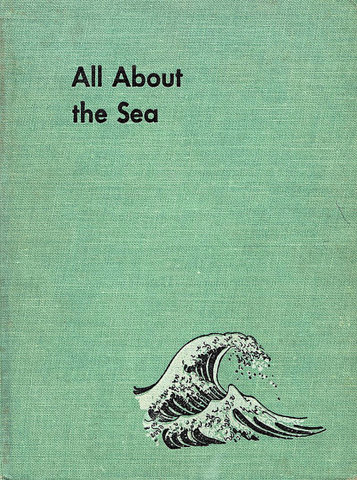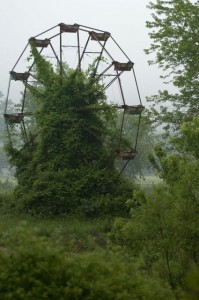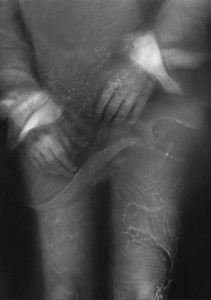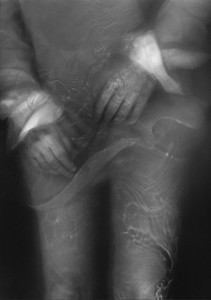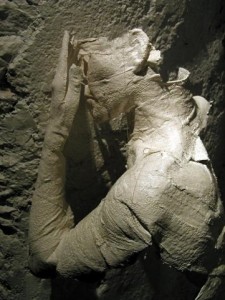(7 Day Intensive at Centre of Gravity, 180 Sudbury Street, Toronto, Spring, 2011. Talks by Michael Stone, notes by MH (with errancies, mishearings, conjectures.) This is talk 6 of 8 on Dogen’s text Time is Passing), written in 13th century Japan.)
At the end of the five days, Michael says there is a feeling of ‘just starting’. He felt this at last summer’s intensive. He feels the same this week. Michael refers to teacher and student, Krishnamacharya and Pattabhi Jois. Michael teaches what his teachers have taught him. You can only teach a tiny speck of what your teachers teach you.
Michael begins with the Uji, and gives us a brief summary of what was taught before. We read out the sections; students recite what they have learnt by heart.
“The moment you climb the mountain, you are time being,” says Dogen. “Time time-being has the quality of flowing. The self and the other are already time. Practice-enlightenment is time. Being splattered with mud and getting wet with water is already time.”
The truth manifests itself as an ordinary person. Buddhas are time. To fully actualize is nothing but being, nothing but time. The mountain is time; it does not forcefully assert itself as being. The pine tree is time; it does not forcefully assert itself as being.
Michael reads, “Yellowstone National Park” by Philip Whalen
I can’t live in this world
And I refuse to kill myself
Or let you kill me.
The dill plant lives, the airplane
My alarm clock, this ink
I won’t go away
I shall be myself –
Free, a genius, an embarrassment
Like the Indian, the buffalo
Philip Whalen, who died in 2002, was a poet often allied with the Beats, but who never became famous in the way that Jack Kerouac and Allen Ginsberg did. He was a real practitioner, like Gary Snyder, and he was not merely interested in the themes of Buddhism in the way that Kerouac or Ginsberg were, but in real practice. When he was writing poetry, Whalen put sounds in the margins of his poems. A horn, a bird call, anything he heard.
Michael tells us he has always loved Philip Whalen, and that he once went on a pilgrimage with his son to see Whalen’s living quarters. In the room where Whalen once lived, there were books lined on the shelves. Those were Whalen’s only possessions. Within the used books Michael found with poems that Whalen had copied out by hand to send to his friends.
We move through the world as plain people. We are spectacular. Yoga is eccentricity. Through it we become ourselves. Michael explains how the first five years of practice were for him trying to be like something. But we shouldn’t try to be what we are not. Anna shouldn’t be like Jess. Don’t try to be like others. Let go and be yourself. Yellowstone Park doesn’t try to be like Algonquin Park. We practice because we are already enlightened. We don’t steal because we are interconnected. Michael encourages us to hold lightly to what’s going on. When under pressure, hold it lightly. Time holds us lightly. There’s gentleness in the process of breathing. There’s subtleness in the process of breathing, of the exchange of air through the cell membranes. How intimate is that? The little lungs of the bird and the squirrel reverberate. The breath holds us as gently as the hours.
Michael shares with us the Chinese calendar, telling us how this cycle of 12 animals represents the hours of the day. Each one of the 12 animals map a time of day, each hour named by the animals that are awake at that time. The same animals are used to speak about the directions. The same animals correspond to cosmological time.
When we practice, can we be mindful of the moods and irritations present in us? Michael explains how he had something to drink last night and how we woke up grumpy. Then he realized it was time to practice. “Oh,” he said to himself, “I don’t have to be grumpy.”
Time being is beyond concepts. The map is not the territory. To truly map out a city, you would have to include the breathing, the trees, the encounters, the cracks in the sidewalks. Each being is being, just like you. Each rat, each cat, each sound, is being, just like you. The cat impacts your experience of yourself.
Michael tells us to drop our ideas of spiritual practice. When you are caught up in addictions and habits, you are exhausting yourself. When you hear the sound of brakes during meditation, the sound of the brakes is just like you.
What is doubt? When is it beneficial? When is it unnecessary? Inquiry might be a better word in some cases. “It’s like lunch. You don’t always have lunch,” says Michael., relating to what one of his teachers said to him. When it’s time for doubt, have doubt. Closely examine your life, or you don’t understand.
We begin looking at section 14. Dogen says, “Do not think flowing is like wind and rain moving from east to west. The entire world is not unchangeable, is not immovable. It flows. Flowing is like spring. Spring with all its numerous aspects is called flowing. When spring flows there is nothing outside of spring. Study this in detail.”
Everything flows. Like spring, like summer. All the flowers are having their time, flourishing. (Black locusts boom in late-spring. Dahlis bloom in summer. Some amaranthus bloom in autumn.). At a children’s birthday party, some children want the party to be their own, and you have to explain to them that it’s not yet their time. Everything has its time. There is nothing that spring can’t get a hold of. All flowers are having their time. Some flowers bloom in April. Some in May.
Now it is summer. In summer, every part of you is summer. Like you, summer has no beginning. “Where did you begin?” Michael asks. Did you begin as thought of your mother when she was in second grade and looked at a boy, and she thought, “He’s cute, I would like to marry him.” Seasons don’t begin and end on the solstice, nor do they begin and end on the equinox. Michael asks us to examine this, and doing so we might be able to see flow.
“Don’t lock your bandhas,” said a teacher of Michael’s. It’s all flow. Yet we still have to lock our bandhas. We still celebrate birthdays and anniversaries. We still mark the passing of time.
During break, Michael asks us to do a partner exercise to help us contemplate flow. As we walk with our partner, he asks us to look for flow on the streets and talk about it. For homework, Michael asks us to write a letter to our partners about what we learnt from this exercise. He asks us when we leave at night to notice the flow in the things that don’t flow, in the things that seem fixed and rigid. (For example, the absence of bike lanes). Notice also how the lens through which we look at things is also flow.
Michael projects Patanjali’s Yoga Sutra, translated by Chip Hartranft, on the wall behind him.
Michael comments how the last century is often thought of as the century of space, of conquering space. Some see the next century as the century of time, a century of managing time.
Every culture tries to find a way to conquer death: for example, the concept of the afterlife, or of nirvana. The people who flew into the world trade centre believed in an afterlife; they believed that they were conquering death. In old age, we don’t think we have a future, we don’t think about it. There is no ‘future prana’.
Patanjali bears a relation to Dogen. The texts of the yoga sutras, likely written by numerous authors, appeared 5-600 years after the Buddha’s death and 800 years before Dogen.
I.1
atha yoganusasanam
atha = now
yoga = process of yoking/union
anusasanam = teaching exposition
Michael translates this, ‘Now is yoga.’
I.2
Yogah citta-vritti-nirodhah
yoga = process of yoking; union
citta = consciousness
vrtti = patterning, turnings, movements
nirodhah = stilling, cessation, restriction
Michael points out that the root of nirodhah, ‘rod’ means radical, to get to the bottom of something. Rodah is the goddess of storms. In a storm cloud, at the centre, there is stillness. Citta is the impressionable mind. This sutra is the misidentification with the revolutions of our imagination. Intimacy occurs when we are not hooked onto our patterns, when we can take in others. It means being fully in the storm, but maintaining stillness at the centre.
I.3
tada drastuh svarupe vasthanam
tada = then
drastuh = seer, witness, pure awareness
svarupe = own essence, identity
avasthanam = state of abiding
The one seeing abides in her self-form. When you are not caught up in reactive patterns, you can be yourself. Then you are free within this self-form. This used to be translated in a vedantic way with ‘self’ with a capital ‘S’. As such, there has been a split in our understanding of this sutra.
Dogen is asking you to be in this immanent world without transcending it. How can you flow? How can you be like the trees? How can you live for the purpose of benefiting others? How can you exist for the purpose of serving others?
Michael says he has been encouraging one of his students, Grant, to stay in the field of architecture. Architecture needs yogis. Unfortunately, Michael says as an aside, our architects are mostly men – just look at the phallic skyline!
Roll up your sleeves and look at the river – clean it up. Help the elderly. The world needs you. The true self is forgetting the self. When you forget about yourself, you get touched. We are not a persona or a position; we are free in each moment to respond to our circumstances, whether we are picking coconuts, helping an old woman, or stuck in traffic.
Guanyin is in her life. One who hears the cries of the world becomes Guanyin. She’s balancing the ocean, she’s off kilter. She’s in her life and living imperfectly. She’s trying to get her balance, she has a dog leash in one hand and a coffee in the other. Her vase is filled with salt water, it is a vase filled with tears. She pours the tears of our sadness and the tears of our joy back into the ocean. How much poverty, inequality and wounds exists in this world. You cry because you’re human. Guanyin gives your tears back to the ocean. Guanyin is a resident at the Centre of Gravity. She is abiding in her life.
Michael jokes, this sutra could be translated as “The Dude abides.”
Hold your frustrations lightly. In your hand, hold two tools: one for balance and the other for commitment. Allow the salt water to flow. Some people can’t let it flow. If there is sadness, let it flow. If there is joy, let it flow.
She could be called our ‘Babbisattva’, our grandmother; she’s our attendant in us keeping it real.
